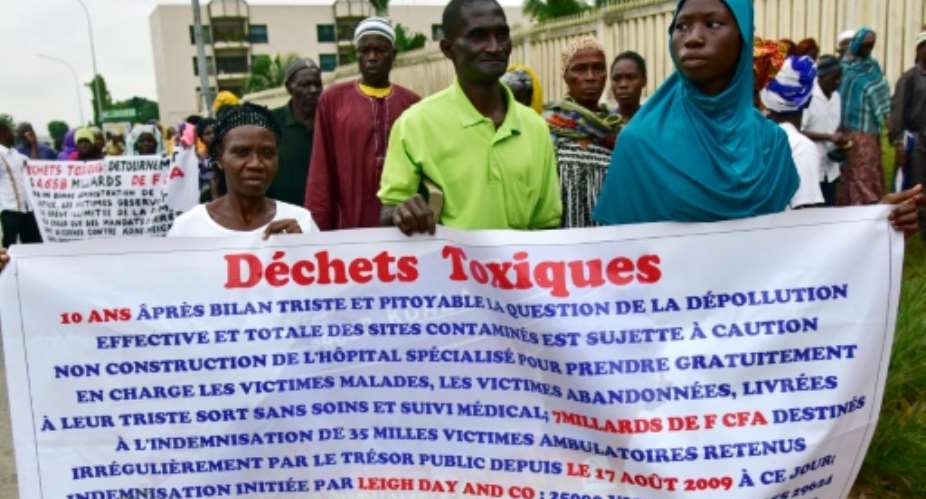Abidjan (AFP) - Ten years after an international oil-trader dumped 500 tonnes of toxic waste in Ivory Coast, killing 17 people and harming 100,000, the stench remains, though the compensation is unpaid.
A decade on, Ivorians "still complain of the smell from the waste when it rains heavily, as well as headaches, skin problems and respiratory issues", a panel of United Nations experts said in a statement.
"Many victims have not received an adequate remedy for the harms ... and report they have not been able to afford medical treatment," they added.
On Friday's anniversary of the Probo Koala cargo ship scandal, victims and the UN experts urged the trader, the Ivorian government and the international community to ramp up efforts to settle the longterm health and environmental effects.
"We demand the total and absolute decontamination of the water table polluted by toxic mud," said Claude Gohourou, who heads a group of victims of the August 19, 2006 incident.
That day the Probo Koala dumped a dozen containers worth of caustic soda and petroleum residue owned by Anglo-Dutch commodity trader Trafigura in some 18 locations around Abidjan.
Other dumpsites remain unknown to this day and the UN experts warned that it remained unclear whether the waste had entered the water supply or food chain.
The waste originally was to have been dumped in the Netherlands, but the costs of disposal there were deemed too high so the cargo a month later discharged it in west Africa instead.
In a lengthy legal battle slowed by a period of civil conflict in Ivory Coast, Trafigura agreed to inform and decontaminate, but Gohourou said the multinational trader had failed to stick to the deal.
And the head of another victims' group, Denis Yao Pipira, deplored Friday that the commodity trader had never been forced into court to face charges.
- 'Abandoned, vulnerable' -
Trafigura, which denies any link between the waste and the deaths, in 2007 agreed a settlement with the Ivorian government for 152 million euros ($172 million based on today's exchange rate).
Only some 60 percent of registered victims are estimated to have received compensation, however.
A second out-of-court settlement was agreed in 2009 for 33 million euros involving 30,000 people to be paid in Britain. But funds for 6,000 of them were misappropriated before payout.
In London this year, the thousands due the payouts won an English High Court claim against their lawyers, London-based legal firm Leigh Day.
They were found negligent for using an Ivorian bank account to park the lump sum, leaving it open to embezzlement.
Leigh Day "should have known before they sent the money that Ivory Coast was quite unstable, it was divided between two warring factions... and by their own admission, they saw signs of rampant corruption," the claimants' lawyer Kalilou Fadiga told AFP.
Meanwhile, thousands of claimants this year also launched a class action suit in the Netherlands against Trafigura.
Warning that many victims had been left "feeling abandoned and vulnerable", the UN experts expressed concern they could be exploited by the many associations being set up in Abidjan.
"The government must ... ensure that people do not become victims twice over -- of both the dumping and unscrupulous actors."





 Former Kotoko Player George Asare elected SRC President at PUG Law Faculty
Former Kotoko Player George Asare elected SRC President at PUG Law Faculty
 2024 elections: Consider ‘dumsor’ when casting your votes; NPP deserves less — P...
2024 elections: Consider ‘dumsor’ when casting your votes; NPP deserves less — P...
 You have no grounds to call Mahama incompetent; you’ve failed — Prof. Marfo blas...
You have no grounds to call Mahama incompetent; you’ve failed — Prof. Marfo blas...
 2024 elections: NPP creates better policies for people like us; we’ll vote for B...
2024 elections: NPP creates better policies for people like us; we’ll vote for B...
 Don’t exchange your life for wealth; a sparkle of fire can be your end — Gender ...
Don’t exchange your life for wealth; a sparkle of fire can be your end — Gender ...
 Ghana’s newly installed Poland train reportedly involved in accident while on a ...
Ghana’s newly installed Poland train reportedly involved in accident while on a ...
 Chieftaincy disputes: Government imposes 4pm to 7am curfew on Sampa township
Chieftaincy disputes: Government imposes 4pm to 7am curfew on Sampa township
 Franklin Cudjoe fumes at unaccountable wasteful executive living large at the ex...
Franklin Cudjoe fumes at unaccountable wasteful executive living large at the ex...
 I'll 'stoop too low' for votes; I'm never moved by your propaganda — Oquaye Jnr ...
I'll 'stoop too low' for votes; I'm never moved by your propaganda — Oquaye Jnr ...
 Kumasi Thermal Plant commissioning: I pray God opens the eyes of leaders who don...
Kumasi Thermal Plant commissioning: I pray God opens the eyes of leaders who don...
